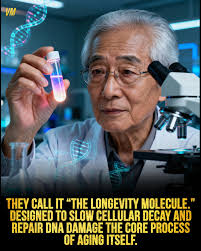In a groundbreaking scientific breakthrough, Japanese scientists have announced progress on a longevity drug that could dramatically extend the human lifespan possibly up to 250 years.
The revelation has sparked global excitement and debate, as experts describe it as one of the boldest advancements in modern medicine.
The experimental treatment reportedly targets senescent cells aging cells that no longer divide but release harmful compounds that damage healthy tissue.
By clearing out these “zombie cells,” researchers say the drug can rejuvenate organs, repair DNA, and restore overall body vitality.
Moreover, the therapy combines senolytic compounds with advanced DNA repair enzymes, tackling the biological roots of aging rather than just its symptoms.
In preclinical trials on mice, scientists recorded longer lifespans, improved immunity, and increased energy levels.
These results have raised strong hopes that similar effects might soon be achieved in humans.
Meanwhile, experts have called the development an early step toward age-reversal medicine a field once confined to science fiction.
If proven successful in human trials, the treatment could revolutionize how the world views aging, health, and mortality.
However, researchers have also urged caution. They stress the need to address ethical, economic, and social implications before large-scale application.

A world where humans could live for centuries, they say, must prepare for new challenges in population, healthcare, and sustainability.
In a related discussion, Nigerian medical expert Dr. Ibrahim Wada, Founder of Nisa Medical Group, echoed the optimism around such advancements.
Speaking on March 6, 2025, at the University of Port Harcourt, he predicted that people could realistically live up to 250 years within the next four decades.
Wada, an Associate Professor of Obstetrics and Gynecology, said: “Recreating stem cells from a person’s genes and reintroducing them into the body can regenerate dead cells and significantly extend lifespan.”
In addition, he explained that breakthroughs in genetic reprogramming, stem cell science, and artificial organ development could redefine what it means to grow old. “In another 30 to 40 years, it will be normal for individuals to expect to live for 200 or even 250 years,” he added.
Furthermore, Wada emphasized that the Japanese scientists longevity drug supports this vision by combining cutting-edge biotechnology with DNA repair.
He noted that science has now reached a stage where genetic codes can be read, edited, and optimized to slow or even reverse biological decline.
Beyond laboratory research, Wada urged the public to adopt healthy habits that complement these scientific advances.
“Rest is essential for brain function. So, when it is time to rest, you must allow the brain to rest no compromise,” he advised.













